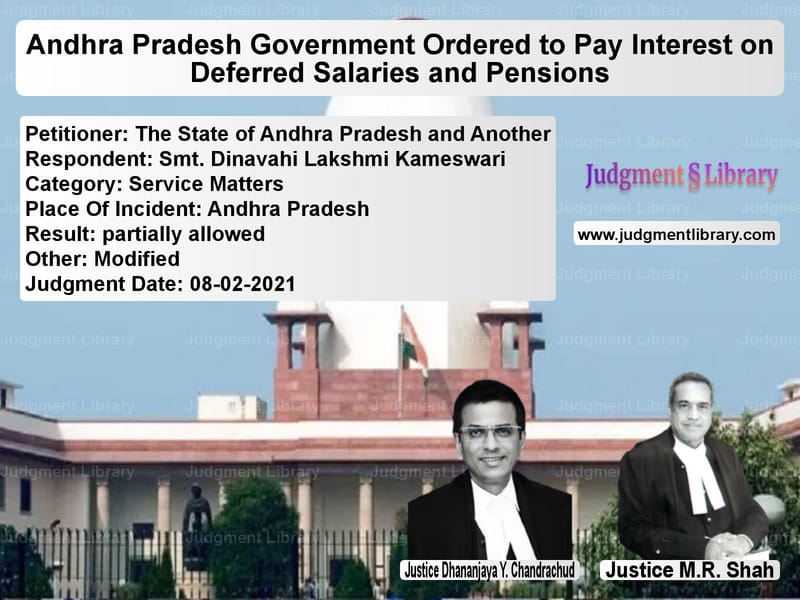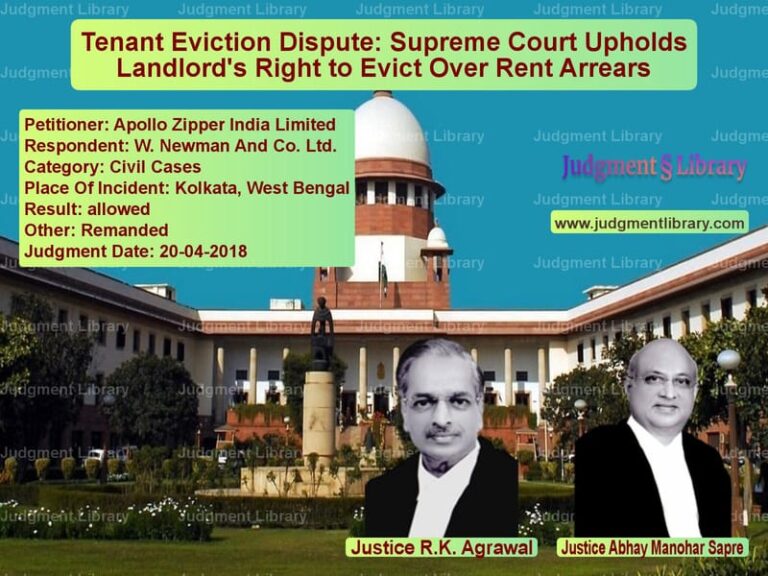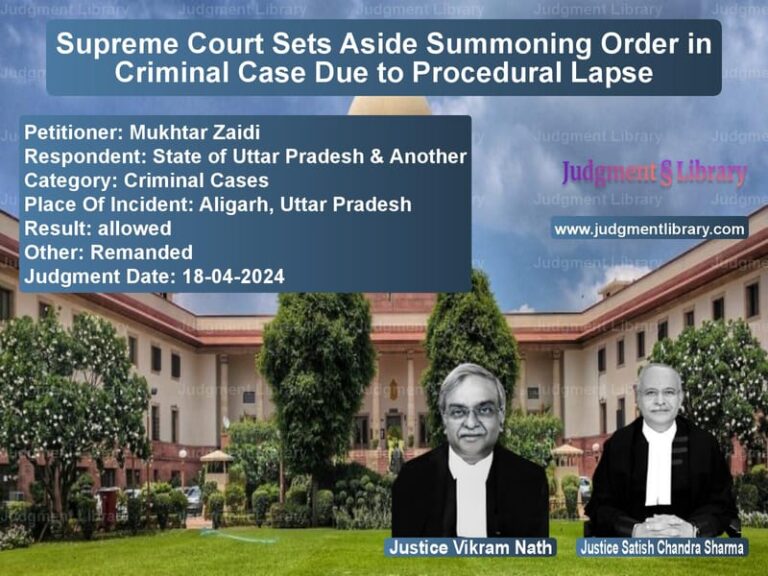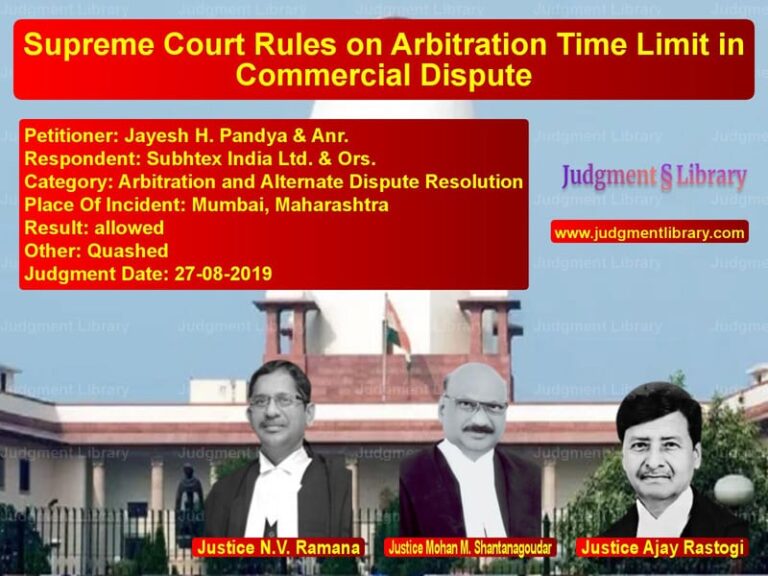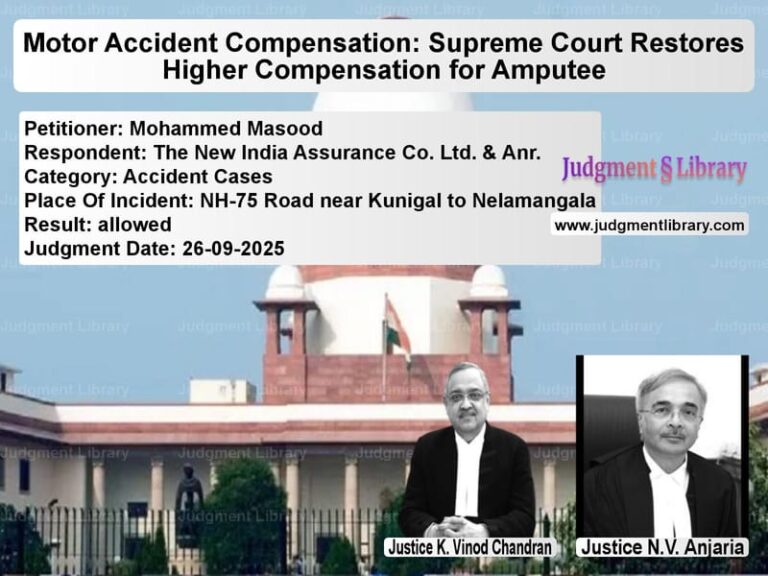Andhra Pradesh Government Ordered to Pay Interest on Deferred Salaries and Pensions
The Supreme Court of India recently delivered a crucial verdict in the case of The State of Andhra Pradesh and Another vs. Smt. Dinavahi Lakshmi Kameswari, addressing the legality of deferred salaries and pensions imposed by the Andhra Pradesh government during the COVID-19 pandemic. The dispute centered around whether the deferment was lawful and if the affected employees were entitled to interest on delayed payments.
The case arose when the Andhra Pradesh government, through Government Orders (GOMs) No. 26 and 37, issued in March and April 2020, deferred the payment of salaries and pensions due to a severe financial crisis induced by the pandemic. The High Court ruled against the State, directing full payment along with 12% annual interest. The government then appealed to the Supreme Court, contesting the interest component.
Background of the Case
Government’s Decision to Defer Payments
Due to a significant drop in revenue during the first quarter of 2020-21, the State of Andhra Pradesh found itself in financial distress. The revenue shortfall was severe, amounting to a 52% decline compared to the previous financial year. In response, the government decided to defer payments as follows:
- 100% deferment for Chief Minister, Ministers, MLAs, MLCs, and other elected representatives.
- 60% deferment for All India Service Officers (IAS, IPS, IFS).
- 50% deferment for all government employees, except Class-IV staff.
- 10% deferment for Class-IV employees, contract workers, and village/ward secretariat employees.
However, exemptions were later granted to frontline workers in health, police, and sanitation departments, and subsequently, full pensions were restored for all retirees.
Legal Challenge and High Court’s Ruling
The respondent, Smt. Dinavahi Lakshmi Kameswari, a retired District and Sessions Judge, filed a writ petition under Article 226 of the Constitution, challenging the legality of the deferment orders. The Andhra Pradesh High Court ruled in her favor, highlighting the following points:
- Salaries and pensions are constitutionally protected rights and cannot be deferred arbitrarily.
- Under Rule 9 of the Andhra Pradesh Revised Pension Rules, 1980, pensions can only be withheld in cases of grave misconduct or negligence, which was not applicable in this case.
- Article 72 of the Andhra Pradesh Financial Code mandates salary payments at the end of each month.
- Deferring salaries and pensions violated Article 21 (Right to Life) and Article 300A (Right to Property) of the Constitution.
- The government’s reliance on the Disaster Management Act, 2005, was misplaced as the Act did not provide for deferment of salaries and pensions.
The High Court directed the Andhra Pradesh government to immediately release the pending payments along with 12% interest per annum.
Supreme Court’s Observations and Judgment
The State of Andhra Pradesh, while complying with the High Court’s directive to release payments, challenged the imposition of 12% interest before the Supreme Court. The apex court, comprising Dr. Dhananjaya Y. Chandrachud and M.R. Shah, deliberated on the matter and issued the following key observations:
- Salaries are a legal entitlement for employees and must be paid promptly.
- Pensions are a rightful claim for retired personnel in recognition of their past service.
- The government’s financial distress due to COVID-19 was acknowledged, but the deferment order lacked statutory backing.
- While the state cannot escape responsibility for delayed payments, the 12% interest rate imposed by the High Court was excessive.
Considering the prevailing bank interest rates, the Supreme Court modified the High Court’s order and reduced the interest rate to 6% per annum. The government was directed to clear the interest payments within 30 days.
Key Takeaways from the Judgment
- The deferment of salaries and pensions was deemed unlawful since it lacked a legislative basis.
- Government employees and pensioners were entitled to interest due to the delay in payment.
- While financial distress was considered a mitigating factor, the State was not absolved from liability.
- The interest rate was lowered from 12% to 6% to align with standard banking rates.
Conclusion
This judgment serves as a significant precedent regarding government obligations towards employees, particularly during emergencies. It reinforces the principle that salaries and pensions are protected entitlements that cannot be arbitrarily withheld. The ruling ensures that governments remain accountable for honoring financial commitments, even in times of crisis.
Petitioner Name: The State of Andhra Pradesh and Another.Respondent Name: Smt. Dinavahi Lakshmi Kameswari.Judgment By: Justice Dhananjaya Y. Chandrachud, Justice M.R. Shah.Place Of Incident: Andhra Pradesh.Judgment Date: 08-02-2021.
Don’t miss out on the full details! Download the complete judgment in PDF format below and gain valuable insights instantly!
Download Judgment: the-state-of-andhra-vs-smt.-dinavahi-lakshm-supreme-court-of-india-judgment-dated-08-02-2021.pdf
Directly Download Judgment: Directly download this Judgment
See all petitions in Employment Disputes
See all petitions in Pension and Gratuity
See all petitions in Contractual Employment
See all petitions in Judgment by Dhananjaya Y Chandrachud
See all petitions in Judgment by Mukeshkumar Rasikbhai Shah
See all petitions in partially allowed
See all petitions in Modified
See all petitions in supreme court of India judgments February 2021
See all petitions in 2021 judgments
See all posts in Service Matters Category
See all allowed petitions in Service Matters Category
See all Dismissed petitions in Service Matters Category
See all partially allowed petitions in Service Matters Category

